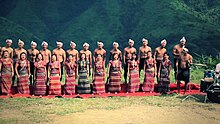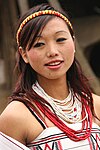|
Mara people
The Mara (Mara; pronounced [mərà], မရာ; pronounced [mərà]) (as also called Lakher in acient time) people are an ethnic group of Mizoram state, India and, Chin state, Myanmar. [2][better source needed] EtymologyWhile the people call themselves Maras, several exonyms have formed from neighbouring tribes and clans. The Lushei clans referred to the Maras as Lakher. Early British encounters named the tribes as Shendu before adopting the Lushei exonym.[3][4] GeographyMaraland is split between India and Burma, right at their border. West MaralandWest Maraland is located in Mizoram, India with its own district and autonomy. East MaralandEast Maraland is located in Chin state, Burma. It's split into 2 districts: Thantlang District and Matupi District, with the former locally known as "Chha Mara", and the latter "Fei Mara". HistoryEarly MigrationsThe Mara people are said to have arrived from the North and are presumed to have been pushed further south by pressure from the East. They settled originally between Leitak and Leisai before moving through several settlements and crossing the Kaladan river and establishing themselves in Phusa in the Lushai Hills. From Phusa, the Mara migrated to Beukhi, where the Siaha and Saiko Tlongsais separated and established settlements with endonymic names, namely Siaha and Serkawr. It was estimated the Mara were settled in the Lushai Hills between 300-400 years ago.[a][5] Notes
References
External links |
||||||||||||||||||

